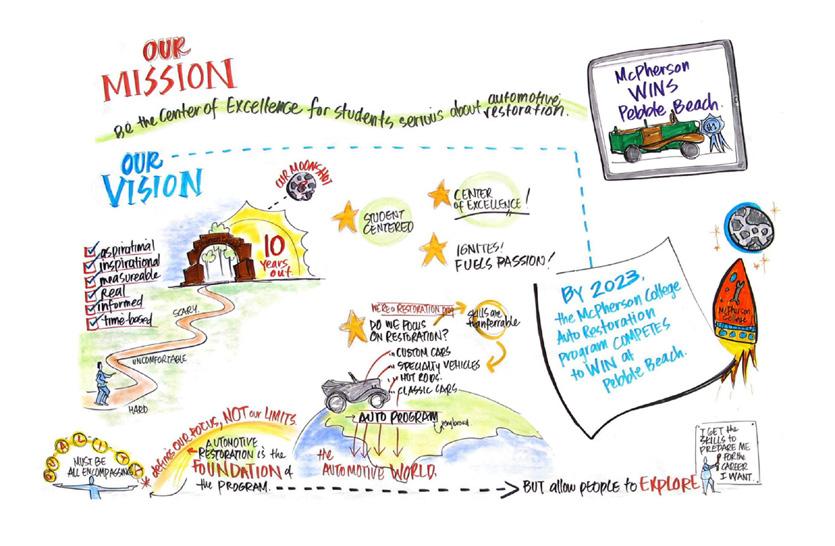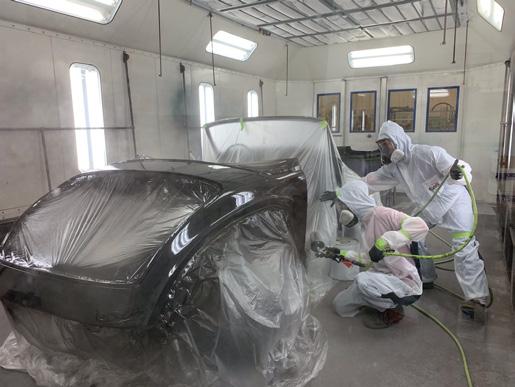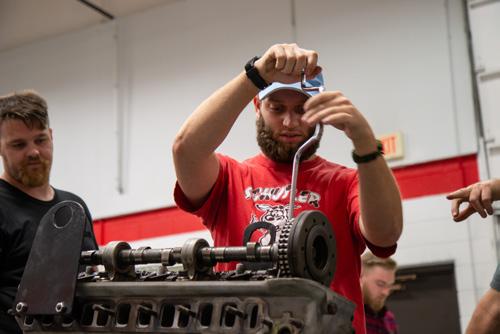
4 minute read
How we got here
For more than four decades, the automotive restoration program at McPherson College has been a launching pad for young people interested in turning a love for the automobile into a career. Throughout its history, the program has built on a tradition of excellence, passing numerous milestones along the way. Showing a car, completely restored by students, at the Pebble Beach Concours d’Elegance is the latest milestone that will set the course for the program’s future.
In 2013, a group that included alumni, advisory board members, and administration took a deep dive into the program’s future and defined a mission to be the center of excellence for students serious about automotive restoration. With this mission, a lofty, bold, and audacious goal was set — to compete at Pebble Beach with a car restored entirely by students. We called it our moonshot.
Finding the right car was critical to achieve this goal. The 300 S was on the shortlist because the scale of this project fits nicely into the program’s educational model. Other considerations included the close relationship with Mercedes-Benz Classic Center and the availability of reference materials for student use. Finally, established relationships with Mercedes-Benz experts among alumni and friends of the program made the marque attractive.
The search for the right vehicle took almost two years. After several unsuccessful attempts at securing a project, the 1953 Mercedes-Benz 300 S appeared almost serendipitously.
A gentleman from Pennsylvania reached out to Paul Russell of Paul Russell & Company in Essex, Mass., who is also the chair of our advisory board. The man was looking to sell some cars. One of them was the 300 S.
The car was complete, only had 35,000 miles, and included a wealth of spare parts and an additional engine. The vehicle was owned by Richard and Mary Hopeman, who kept the car in a beautiful old stone building. Paul traveled to meet with the Hopemans and told them of McPherson College, our students, and our bold vision for a student-restored car to compete at Pebble Beach.
Richard and Mary were intrigued. Richard had a long career in engineering and project manage- ment, and he and Mary had worked in higher education. The Hopemans were excited that their Mercedes-Benz, which had given them so much joy, could be the signature project for the program.

Shortly after the transfer of the Mercedes-Benz to McPherson, Richard passed away. Yet the Hopemans, and their beloved car, are forever intertwined with the story of McPherson College and our students. The car was unveiled in 2016 at a private event at Pebble Beach, and its restoration began.
The goal of competing at Pebble Beach is about much more than getting a car on the field. It is about the educational value that comes working on a project of such magnitude. The project en- in historical research, assessment and documentation, project management and organization, communication, group presentations, professionalism, and accountability.
This project has underscored the importance of transforming students’ learning experiences, educational goals, and outcomes by expanding their access to experts, industry networking opportunities, and skill development activities.
The auto restoration moonshot also has implications for the rest of McPherson College. The college’s strategic plan, Community by Design, outlines a future for liberal arts that combines general education with professional studies by developing compasses both the technical skills necessary for a concours-level restoration and the liberal arts components of the auto restoration degree. Throughout the restoration process, students have gained valuable skills in every area of the shop: metalwork, paint, chassis, drive train, engine, wood, and trim. They have also gained experience a creative environment of funded, innovative ventures that solve problems and meet the needs of the greater community. The plan is for our moonshot project to model innovative approaches to pedagogy, curriculum development, and learning experiences to assist students’ paths forward.







